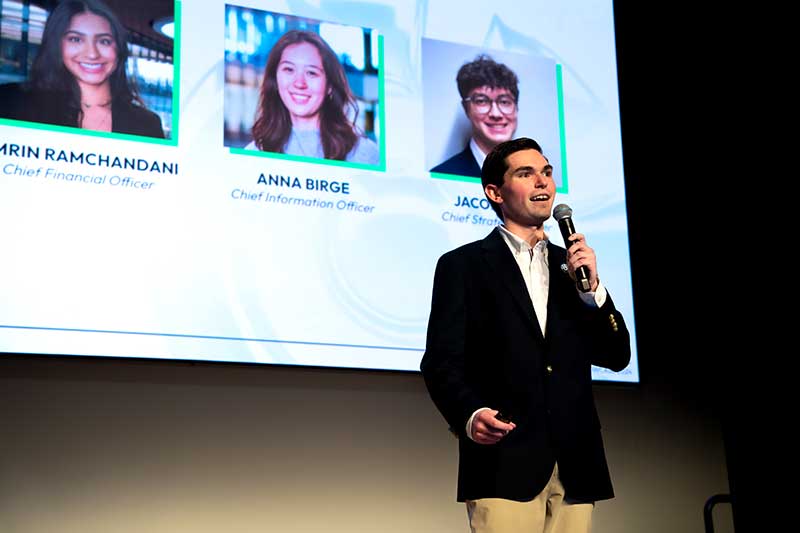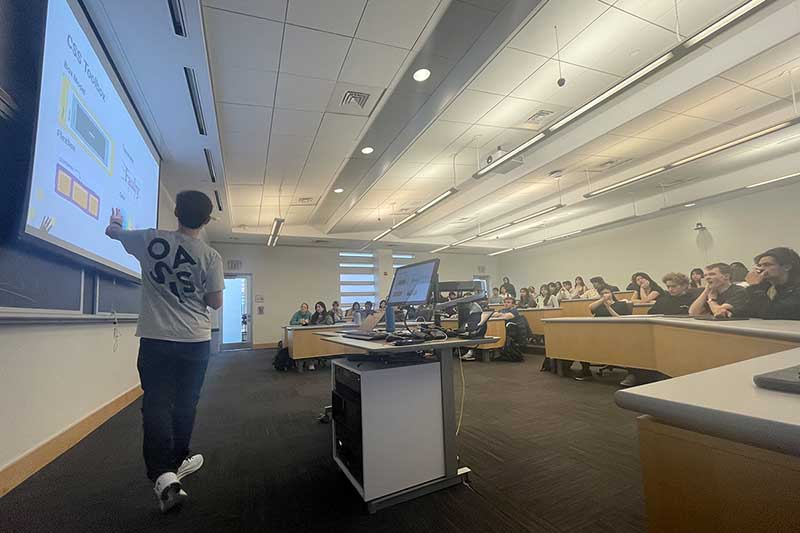Khoury News
For Jay Sella, giving knowledge back is an essential part of learning
Whether through TA work, club leadership, or redesigning an introductory computing seminar, the fourth-year CS and business student has made it his mission to elevate his fellow students.

Some students have truly championed Khoury College’s “CS for everyone” mission.
Jay Sella, a fourth-year computer science and business administration major, has been heavily involved in the success of other students, whether through mentoring, curriculum design, or club leadership.
“I really enjoy doing what I can to help others by giving back and teaching based on my own learnings and experiences,” Sella said. “A big part of that is seeing how different individuals approach problems and try to solve them.”
Sella’s role as a leader began when he worked as a teaching assistant for “Fundamentals of Computer Science 1.” He then followed that cohort of students to “Fundamentals of Computer Science 2.”
After that, Sella continued in “Object-Oriented Design” (OOD) as one of eight head TAs. There, alongside Mark Fontenot and his fellow TAs, he helped create “course materials, lab guides, programming assignments, exam questions, grading rubrics, and feedback templates for students,” he said.
During that semester, Fontenot and Claire Wassinger, Khoury College’s associate director of program development and undergraduate student engagement, were trying to reimagine the college’s first-year seminar.
“Many students’ had disparate exposure to, knowledge of, and comfort with tools that were not directly part of any one course’s curriculum,” Sella explained. “Some classes and professors expected students to know things without explicitly teaching them. Also, students had expressed interest in learning more industry tools and technology prior to their first co-op.”
Sella was invited to serve as a curriculum innovation developer. In that role, he “ideated ways to restructure the course, engage students, incorporate ‘missing semester’ curriculum, and expose first-years to a wide range of disciplines before honing in on a specific focus area,” he said. He and his fellow designers asked questions and drew from their own experiences: “How can we better expose students to real-world tools and technologies? What was valuable in our own professional journeys? What do we wish we had learned sooner?”
One goal was allowing students to explore different areas of computer science as first-years and to accommodate students’ fluctuating levels of understanding entering the course. So, Sella and others redesigned the course — now fully asynchronous and self-paced — to include guest speakers, Khoury professors discussing their research, more hands-on projects, videos of former students detailing their experiences, and short quizzes and guided projects that let students try out things they had learned.
The rewrite, Sella explained, had three main components: “Personal, which included time management, transitioning to college, and goal setting; professional, which focuses on giving and receiving feedback, personal branding, and mastering behavioral interviews; and technical, which is the theory and application of computer science topics.”
Sella also played a role in adapting some of the projects in OOD to engage students more. One of these projects was a DIY digital bullet journal, a personal organization tool that students could use to keep track of to-dos while adding features to allow them to track, search, and tag entries.
Sella explained that the project included “new requirements and feature requests every few days, mimicking a real-world development project. Students had the opportunity to choose a subset of each feature set to implement. They were able to incorporate their own unique flair and build tools that they might use themselves, with the flexibility to focus on aspects of personal interest.”
Sella has also helped design Odyssey, a Coursera-like on-demand learning platform for the Khoury community. For undergraduate and graduate students seeking information on computing topics, Odyssey is a curated place to start.
And Sella’s commitment to his peers’ learning — and to turning his own knowledge into resources and guidance for others — isn’t confined to the classroom. With Oasis, a student group that helps students learn to build their first website or app through workshops, mentorship, and an eight-week bootcamp, Sella served as a mentor and project series director.

In those roles, Sella oversaw weekly workshops and a wiki, a public, on-demand library of guides and resources for those just getting started with web and app development.
Sella is also involved with Generate, a 160-student product development studio that works with venture clients from the Northeastern community to develop hardware, software, and data solutions. He is the operations director, overseeing the group’s finances, member data, relations with industry partners, and professional development for members.
“Generate is a rapidly growing community and we’re coming up on our 10-year mark,” Sella said. “We’re figuring out how to leverage that network as members and alumni become more involved in industry, and we also launched an alumni mentorship program to connect members with alumni.”
In his own professional life, Sella has carried the same spirit of entrepreneurship. His first professional experience as a Khoury student came from a startup called Tadpole, which he learned about when the founder pitched the idea to his OOD class. Tadpole is software that helps educators manage schedules and pay, communicate with students, and more.
“While I started as a summer software engineer, I became increasingly involved as the team and scope expanded,” Sella explained. “My role grew over time, and eventually I took over as lead software engineer and technical product owner.”
With this experience, Sella had the confidence to initiate his first co-op at Chick-fil-A.
“I hadn’t heard of someone doing a co-op there before, and I doubted they had a co-op program. I knew about their mobile app, but I didn’t think of them as a ‘tech company,’” he said. “One day, I checked their job postings in case they offered a summer internship and found that they offered a rotational co-op program.”
After completing two consecutive co-ops with Chick-fil-A, Sella plans to return as a full-time digital fellow in July.
Although he did not necessarily set out to find influential mentors or become a prominent figure in the Khoury community, Sella explained that by “being involved in organizations on campus and teaching assistant roles, you have the opportunity to forge those connections.”
“I’m passionate about educating others and taking my own learnings to give back,” he added. “I love the intersection of technology and finding ways to take my background and improve processes for others.”
The Khoury Network: Be in the know
Subscribe now to our monthly newsletter for the latest stories and achievements of our students and faculty